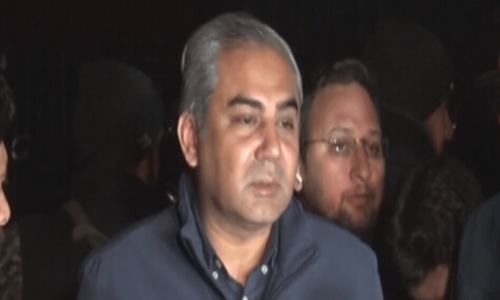
THE wind is dusty on a calm but hot day and people are hardly visible on the dilapidated roads of Pasni, a town in Gwadar district.
In the evening, as the heat lets up, fishermen gather in the harbour area. Not for fishing, but to play cards and tell stories as they wait for the fisheries to reopen. Their livelihood is suspended due to silt-ups, and boats are stuck in the sand around the harbour.
The fishermen in a group that my colleague Behram and I sat and spoke with are all worried. Kauda Abul Kareem Baloch, 53, leads this party. Sporting a nicely trimmed beard and wearing a loose Baloch-style shalwar-kameez, Kauda speaks Balochi rapidly and likes to tell stories. But Meeru Baloch, his close associate, decides to have none of it, interjecting him over his monologue about what his father would do some 30 years ago for Pasni’s fishermen community. “Talk about our harbour, not about what your father did three decades ago!” he exclaims, and goes back to playing cards with his friends.
But, regardless, Kauda is well-respected and even though he dropped out of school as a young boy, the other fishermen appreciate that unlike them he did at least go to one, and have given him the responsibility to speak for the community. Kauda is losing hope just as his associates are. Pointing toward dozens of boats stuck in the sand, he says it’s been a long time they’ve been used. Things, he says, do not look good for his community.
Kauda’s fears are not irrational, not in the least. Over 60,000 people live in Pasni, and fishing is their primary source of employment and income. Due to this reason, the talk of the town is that the rehabilitation of the harbour — which has been closed since 2003 — is paramount. In the run-up to the general elections in July, Pasni only asked for one small thing — fix the harbour. The people here say they don’t care about the water or the electricity, but fishing, Kauda claims, is what puts food on the table.
Situated in Gwadar district, the view of Pasni tehsil from a distance is breathtakingly beautiful. The town is sandwiched between the gushing sea and the desert. But, like other towns in Balochistan, Pasni too does not have good infrastructure. The law and order situation has not been stellar either, but has somewhat improved recently.
With the dawn of relative peace, the Chinese have also appeared on the horizon bearing gifts of promises of rehabilitating the fishing sector in the town.
By Pasni’s fisheries harbour’s account, there are about 13,000 fishermen in the area and some 4,000 boats. The annual catch estimate is 27,600 tonnes. But since the harbour is dysfunctional and with the boats stuck, the current catch is zero.
Abdul Rab Baloch, the deputy director of the harbour authority in the town, while speaking with us, repeatedly stresses the importance of these harbours. He says that what happened to the harbour is just the natural deterioration of the facility. “Everywhere in the world, harbours in port towns do get silted up. The sea ensures that happens,” he tells Dawn at his office, “this is the law of nature. We get stuck and cannot move ahead.”
Newly elected legislators Aslam Bhootani and Hammal Kalmati recently made a visit to Pasni to address this harbour problem. Due to security issues, they said, the Chinese could not accompany them, but local officials claim that the Chinese have vowed to help the fishermen in the town and get the harbour going again. However, the people want more. They want a new harbour — and for good reason it seems. “If they rehabilitate the older one, it will again get silted up in a year or two,” says Kauda, “then, we will again be left high and dry with the same old problems”.
Responding to a question, Abdul Rab Baloch says that the beach expands every five years. “As waves move back in the sea large quantities of sand remain on the beach and the waves take back only a small part of it. The silt keeps growing and growing. The harbour area needs regular maintenance. To do that, we need equipment and resources. But given the tense law and order situation, foreign firms have failed to help us as well.”
Local journalist Sajid Noor — who has been reporting on the harbour for some time — has a grim view of the matter, however. “It is leashed around our neck even though fishermen paid several taxes to the government when the harbour was running.”
Mr Noor does not think the situation will change as he remembers the distant but glorious past of the town: “Pasni used to be the economic hub of the whole Makran area and it used to be a mini free port, where cargoes from Dubai and the Gulf states loaded and unloaded. Now, the town is in the shambles because the bureaucracy does not want to reopen the harbour — it has become accustomed to pocketing the grants.”
Published in Dawn, September 16th, 2018












































